This article explores the concept of wetness, delves into the nature of water, and attempts to provide an answer to the intriguing question, “Is water wet?”
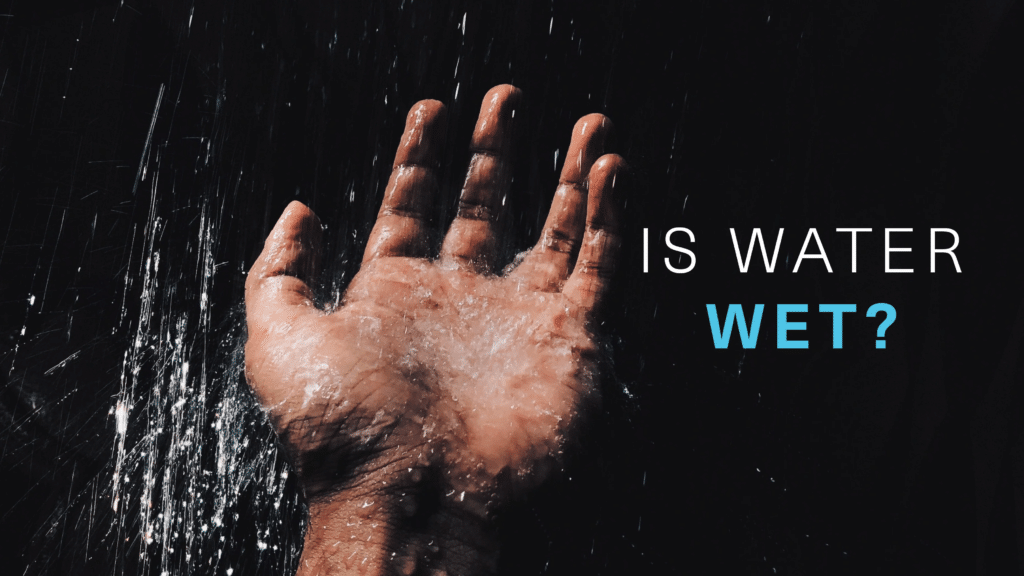
We use it for drinking, cleaning, and various other purposes. But have you ever wondered whether water itself is wet? It’s a seemingly simple question, yet it has sparked debates and discussions among scientists and curious minds.
Related:
Driving In Lagos: The Real Weapons You Need To Win This Daily War
How Many Cups in a Gallon? Your Ultimate Conversion Guide
How Many Ounces in a Shot (Food Conversion Guide)
What are Water and Wetness?
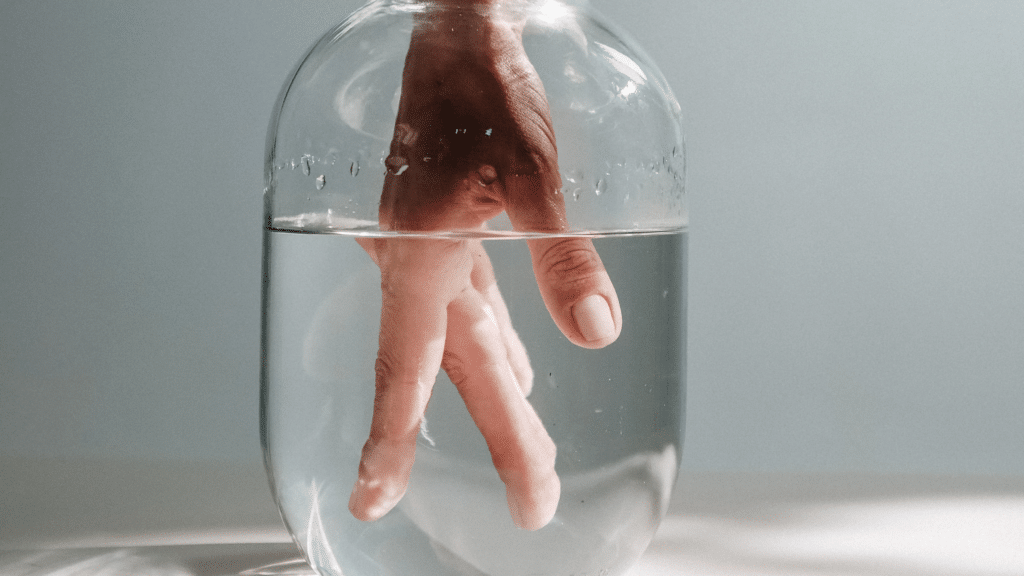
Water is a ubiquitous substance that covers a significant portion of our planet. It is an essential component for sustaining life and is often associated with the sensation of being wet. However, to understand whether water itself is wet, we must first explore the concept of wetness.
Wetness is a term used to describe the state of a substance when it comes into contact with or is immersed in a liquid. It refers to the ability of a liquid to adhere to or interact with a surface, leading to the perception of dampness or moisture.
Water is a unique molecule composed of two hydrogen atoms and one oxygen atom, forming a bent molecular structure. It exhibits several extraordinary properties, including cohesion, adhesion, and surface tension. These properties allow water to form droplets, flow, and adhere to various surfaces.
To determine whether water is wet, we must consider its interaction with other substances. When an object comes into contact with water, the water molecules adhere to its surface, causing it to become wet. However, if we consider water on its own, without any other object involved, it is more accurate to say that water is not inherently wet.
Related: The Best Disposable Vape: A Comprehensive Review
The Perspective of Molecules

From a molecular perspective, water molecules are constantly in motion and are surrounded by other water molecules. They form hydrogen bonds, creating a cohesive network within the liquid. The individual water molecules do not experience wetness, as wetness is a perception of interactions between different substances.
Water’s ability to wet surfaces is due to its adhesive properties. When water comes into contact with a surface, it can adhere to it, forming a thin layer. This adherence allows other substances to interact with the water, leading to the sensation of wetness.
Water can exist in three states: solid (ice), liquid (water), and gas (vapour). In each state, water exhibits different properties and behaviours. While water in its liquid state can make objects wet, ice and water vapour do not have the same wetting effect.
Related: 35+ Creative Neck Tattoo Designs for Men
The Controversy Surrounding Water’s Wetness
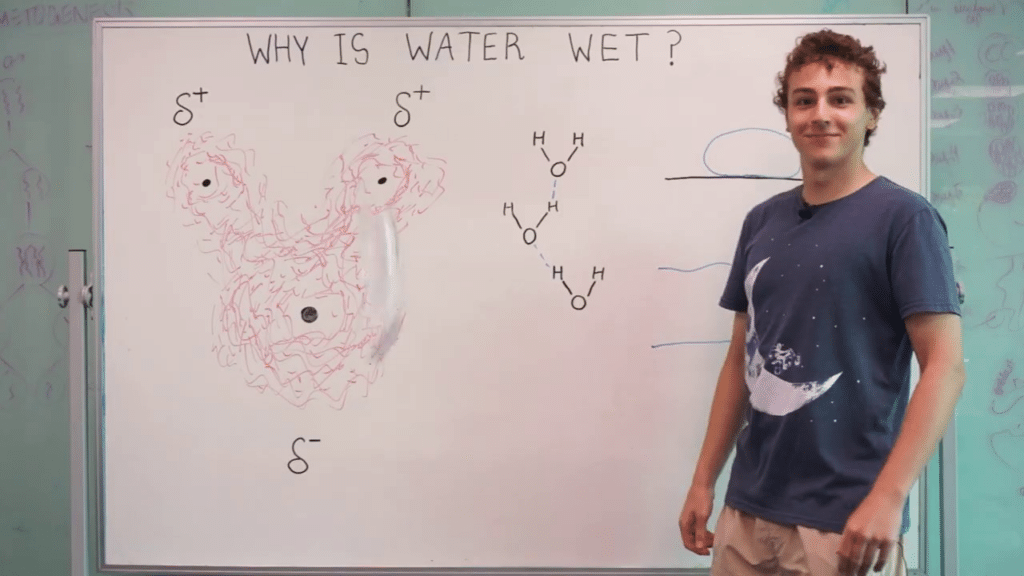
The debate surrounding water’s wetness stems from differing interpretations and definitions of the term “wet.” Some argue that for something to be wet, it must be able to make other substances wet. By this definition, water is considered wet. Others argue that wetness is a sensory experience that cannot be attributed to water.
Wetness is a subjective experience. It is a sensation that we perceive when our skin or other objects come into contact with a liquid. Water evokes the perception of wetness because it easily adheres to surfaces and can be felt as moisture.
Whether water is considered wet or not may seem like a trivial question. However, understanding wetness and water’s behaviour has practical implications in various fields, such as materials science, engineering, and everyday life.
It helps us design water-repellent surfaces, improve water-based technologies, and develop effective cleaning methods.
Related: Transform Your Space: Styling Large Wall Tapestries in Every Room
Scientific Explanations

Scientists have conducted numerous studies to explore the nature of wetness and water’s interaction with other substances. These studies involve examining the molecular structure of water, observing surface tension phenomena, and investigating the behaviour of water on different materials.
There are several misconceptions surrounding the concept of wetness. One common misconception is that wetness is an inherent property of water. However, as discussed earlier, wetness is a sensory perception that arises from interactions between water and other substances.
Another misconception is that wetness is solely dependent on the presence of liquid water, disregarding the state of matter and surface properties.
Related: 100+ Best Haters Quotes to Deal with Negative People
Is Water Wet?
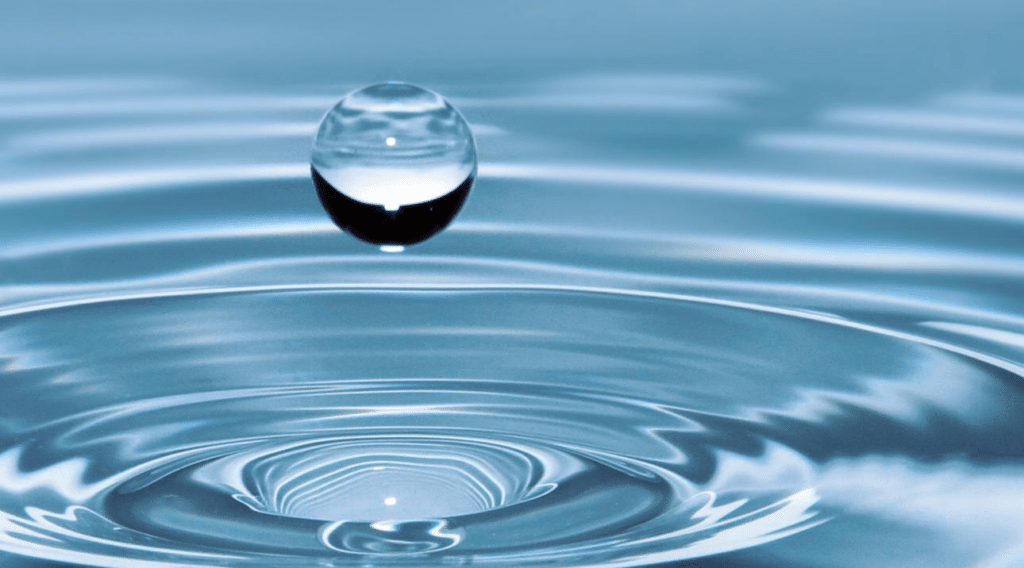
The question of whether water is wet has been debated for centuries. There is no single answer that everyone agrees on, and the answer may depend on how you define “wet.”
The dictionary definition of “wet” is “covered or saturated with water or another liquid.” So, if you define wetness as the presence of water, then water would certainly be wet. However, there is another way to think about wetness.
Some people argue that wetness is not simply the presence of water but rather an interaction between water and another material. When water comes into contact with a solid surface, it forms a thin layer that adheres to the surface. This layer of water is what we perceive as wetness.
According to this definition, water is not wet by itself. It only becomes wet when it comes into contact with another material. This is because water molecules are attracted to each other, but they are also attracted to other materials.
When water comes into contact with a solid surface, the water molecules are attracted to the surface and form a thin layer. This layer of water is what makes the surface feel wet.
So, Is Water Wet?
Ultimately, the question of whether water is wet is a matter of definition. If you define wetness as the presence of water, then water would certainly be wet. However, if you define wetness as an interaction between water and another material, then water would not be wet by itself.
There is no right or wrong answer to this question, and it is ultimately up to each individual to decide how they define wetness.
Related: Most Fashionable Eyebrow Slit Styles and History
Some Additional Thoughts
- Even if you define wetness as an interaction between water and another material, you could still argue that water is wet. After all, water does interact with itself. The water molecules in a liquid are attracted to each other, which holds the liquid together. So, in a sense, water is always wet, even when it is not in contact with another material.
- The question of whether water is wet is not just a philosophical debate. It has practical implications as well. For example, if water is not wet, then it would not be possible to use water to measure the wetness of other materials.
- The question of whether water is wet is also a matter of language. The English language is not always clear or consistent when it comes to the definition of wetness. This is why there is so much debate about this question.
Related: 100+ Romantic and Flirty Freaky Quotes to send to your Partner
Are all Liquids Wet?
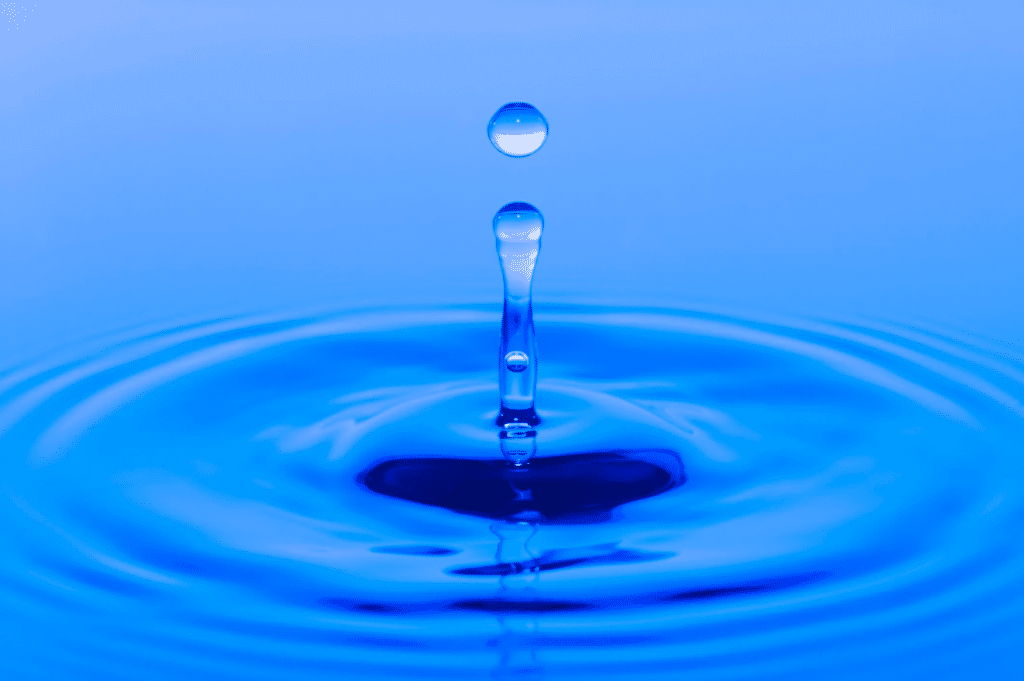
Whether all liquids are wet depends on how you define “wet.” If you define wetness as a liquid’s ability to adhere to a solid’s surface, then all liquids are wet. This is because the molecules in a liquid are attracted to each other, and they are also attracted to the molecules in other materials.
When a liquid comes into contact with a solid surface, the liquid molecules are attracted to the surface, forming a thin layer. This layer of liquid is what makes the surface feel wet.
However, if you define wetness as the sensation of being covered in liquid, then not all liquids are wet. For example, mercury is a liquid metal that does not feel wet when it is split on your skin.
This is because mercury is a non-polar liquid, and the molecules in your skin are polar. The polar molecules in your skin are not attracted to the non-polar molecules in mercury, so they do not form a thin layer of liquid on your skin.
So, whether all liquids are wet depends on how you define wetness. If you define wetness as a liquid’s ability to adhere to a solid’s surface, then all liquids are wet. However, if you define wetness as the sensation of being covered in liquid, then not all liquids are wet.
Related: How Many Pints are in a Gallon? (Gallon to Pint Conversion)
FAQs
Is water 100% wet?
The answer to this question depends on how you define “wet.” If you define wetness as the presence of water, then water is certainly 100% wet. However, if you define wetness as an interaction between water and another material, then water is not 100% wet.
According to the second definition, water is only wet when it comes into contact with another material. This is because water molecules are attracted to each other, but they are also attracted to other materials. When water comes into contact with a solid surface, the water molecules are attracted to the surface and form a thin layer. This layer of water is what makes the surface feel wet.
So, if you define wetness as an interaction between water and another material, then water is not 100% wet. However, if you define wetness as the presence of water, then water is certainly 100% wet.
Ultimately, the question of whether water is 100% wet is a matter of definition. There is no right or wrong answer, and it is ultimately up to each individual to decide how they define wetness.
If water isn’t wet, then what is it?
If water isn’t wet, then it is simply a liquid. A liquid is a state of matter that has no definite shape but takes the shape of the container it is in. Water is a liquid because the molecules in water are attracted to each other, but they are not attracted to each other as strongly as the molecules in a solid. This allows the water molecules to move around and take the shape of their container.
If you define wetness as a liquid’s ability to adhere to a solid’s surface, then water is not wet by itself. It only becomes wet when it comes into contact with another material. This is because water molecules are attracted to each other, but they are also attracted to other materials. When water comes into contact with a solid surface, the water molecules are attracted to the surface and form a thin layer. This layer of water is what makes the surface feel wet.
So, if water is not wet by itself, then what is it? It is simply a liquid. A liquid that can make other things wet.
Is water sticky or wet?
Water is both sticky and wet.
Sticky because of the hydrogen bonds between water molecules. These bonds are strong enough to hold water molecules together in a liquid but also weak enough to allow the molecules to move around and flow. This sticky property is what allows water to form droplets and adhere to surfaces.
Wet because of the way it interacts with other materials. When water comes into contact with a solid surface, the water molecules are attracted to the surface and form a thin layer. This layer of water is what makes the surface feel wet.
So, water is both sticky and wet. It is sticky because of the hydrogen bonds between water molecules and wet because of how it interacts with other materials.
Here are some additional details about why water is sticky and wet:
Stickiness: The hydrogen bonds between water molecules are responsible for the stickiness of water. These bonds are formed when one water molecule’s positive end is attracted to another’s negative end. This attraction is what holds the water molecules together in a liquid.
The hydrogen bonds’ strength between water molecules also allows water to form droplets. When water is in a liquid state, the hydrogen bonds between the water molecules constantly break and reform. This allows the water molecules to move around and flow. However, when water is in a droplet, the hydrogen bonds between the water molecules are more stable. This is because the water molecules are closer in a droplet, making the hydrogen bonds stronger.
Wetness is a liquid’s ability to adhere to a solid’s surface. When water comes into contact with a solid surface, the water molecules are attracted to the surface and form a thin layer. This layer of water is what makes the surface feel wet.
The reason why water is attracted to solid surfaces is because of the polar nature of water molecules. Water molecules have a positive end and a negative end. The positive end of the water molecule is attracted to the negative end of the solid surface, and the negative end of the water molecule is attracted to the positive end of the solid surface. This attraction is what holds the water molecules to the solid surface.
Does the water feel wet to the touch?
Yes, when water comes into contact with our skin or other objects, it can be felt as wet due to its ability to adhere to surfaces.
Can water be wet without interacting with other substances?
No, wetness is a perception that arises from the interaction between water and other substances. Without another substance involved, water is not inherently wet.
Is wetness solely dependent on liquid water?
No, wetness can be experienced with various liquids, depending on their ability to adhere to surfaces and create a perception of dampness.
Can ice or water vapour be considered wet?
No, the wetting effect is most noticeable in the liquid state of water. Ice and water vapour do not have the same wetting properties.
Why is the wetness of water a topic of debate?
The debate stems from different interpretations and definitions of the term “wet.” Some argue that water is wet based on its ability to make other substances wet, while others view wetness as a sensory perception.
Conclusion
The question of whether water is wet has stirred intriguing discussions. While water itself may not be considered wet when isolated, it can make other substances wet due to its adhesive properties. Wetness is a sensory perception resulting from the interaction between water and surfaces.
Understanding the nature of wetness and water’s behaviour has implications in various scientific and practical applications.
If there are any questions, post them below.
